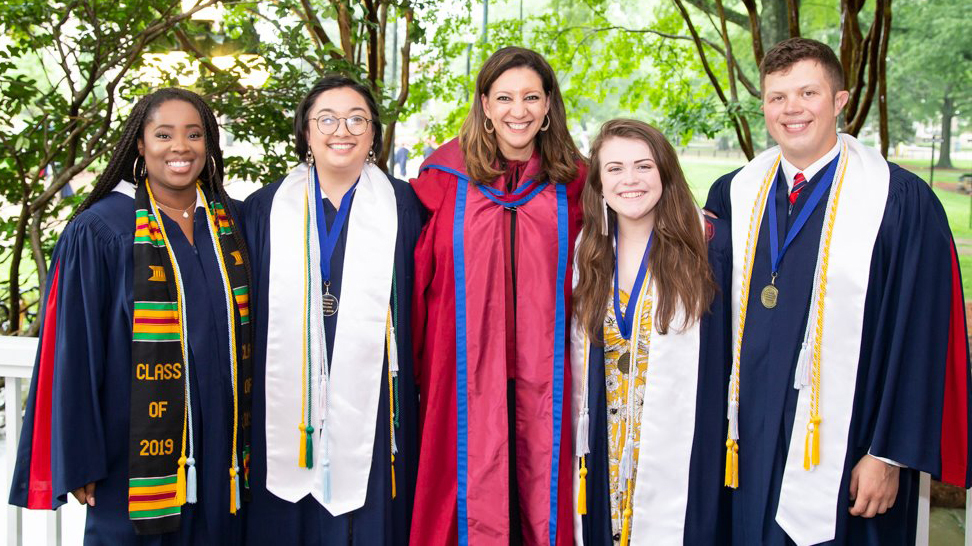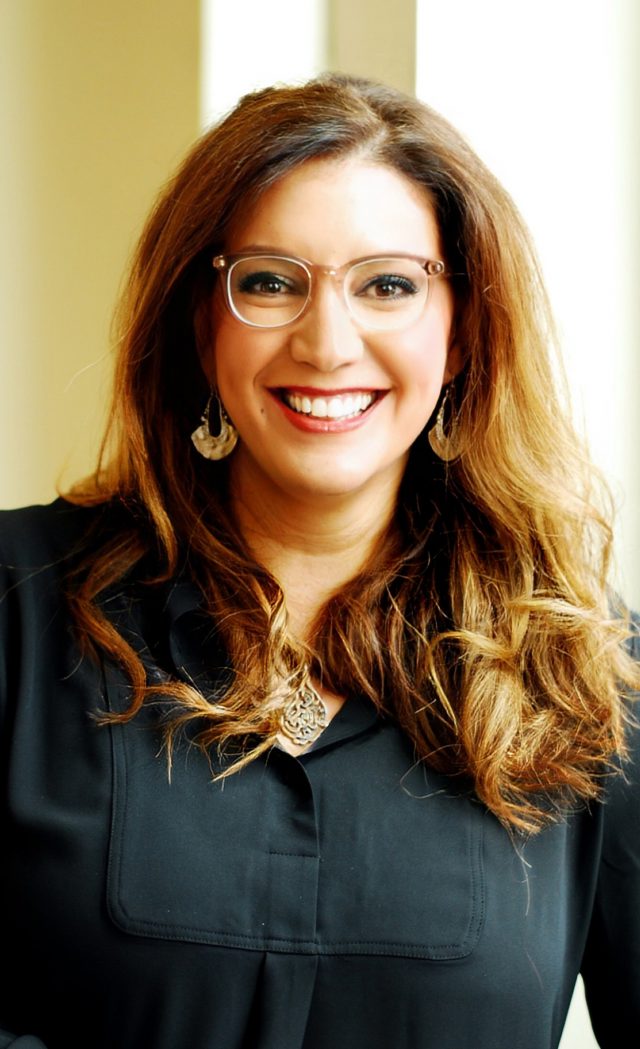Historian discusses Office of National Scholarship Advisement and new book

Vivian Ibrahim (center) and some of her students (from left) Jordan Malone, Cynthia Bauer, Lauren Burns, and Wesley Gerard. Submitted photo
JULY 30, 2023 BY ELISABETH BAILEY
Vivian Ibrahim, Croft associate professor of history and international studies, joined the University of Mississippi in 2011 and was named the College of Liberal Arts’ Howell Family Outstanding Teacher of the Year in 2020.
A historian of the modern Middle East with a doctorate from the University of London, she specializes in religion, ethnicity, politics and nationalism in 19th and 20th century Egypt.
Her publications include “The Copts of Egypt: Challenges of Modernisation and Identity” (I.B. Tauris, 2010; second edition 2013); “Muslims in Ireland: Past and Present,” co-authored with Scharbrodt, Sakaranaho, Khan and Shanneik (University of Edinburgh Press, 2014); and “Political Leadership Nations and Charisma,” co-edited with Margit Wunsch (Routledge, 2012).
She also has a master’s from the London School of Economics and a bachelor’s from King’s College. She held a one-year postdoctoral research position examining European-Muslim identities at University College Cork in Ireland and has taught at several universities in the United Kingdom.
Director of the Office of National Scholarship Advisement, she oversees competitive scholarship and fellowship opportunities by encouraging Ole Miss undergraduate and graduate students to explore their intellectual autonomy, passions and possibilities.
We asked Ibrahim about her work with ONSA and how students can begin the scholarship process:
Talk about why you are drawn to Egyptian history as well as your favorite aspects of the courses you teach.
When I studied history and politics at school, we learned about British kings and their divorces, queens who got their heads chopped off as well as the Second World War. While it was interesting, it was all very Eurocentric.
For instance, what happened to the rest of the world during the Second World War? How do seemingly local conflicts impact the geographies, politics and cultures of other places we rarely study? My teaching and research are informed by these questions in the context of the Middle East and Egypt in particular.
Talk about your new project.
I am so excited about my current book called “Tutankhamun and the Cold War.” Antiquities rarely travelled prior to the “Treasures of Tutankhamun” exhibitions of the 1960s and ’70s. Commonly, displays remained at the museum where they were held.
However, between 1961 and 1981, objects from the tomb of Tutankhamun, housed at the Egyptian National Museum in Cairo, toured the world in unprecedented blockbuster exhibitions. Tokyo in 1965, Paris in 1967, London in 1972 and Moscow in 1974 marveled as the “boy king” was brought to their doorstep.
Between 1976 and 1979, over 8 million people visited the Treasures of Tutankhamun as it toured six different cities in the U.S. These exhibitions were initiated and conceived of by the newly decolonized and independent Egyptian state.
The objects, which included Tutankhamun’s golden funerary mask, exposed citizens of other nations to the most famous of Egyptian antiquities, its heritage and history. The tours promoted cultural diplomacy, raised financial aid and were extraordinary because they precipitated a change in worldwide museum practice to now embrace travelling collections. My new book explores how cultural heritage becomes mobile, embodying and shaping the political ambitions of the modern Egyptian state.
What inspired you to work with the Office of National Scholarship Advisement?

Vivian Ibrahim, Croft associate professor of history and international studies and director of the Office of National Scholarship Advisement, finds the process of helping students apply for national scholarships and discover their passions to be one of the most rewarding of her responsibilities. Submitted photo
I am a first-generation Brit born to Middle Eastern parents. In 2011, soon after finishing my Ph.D., the Arab Spring occurred. At the time, I protested and supported the transition to democracy and free elections. Amidst all the chaos, I got a job at UM and moved from London to Oxford, Mississippi.
Debra Young, associate dean of the Honors College at the time, recognized that my experiences would make me a good interviewer for awards like the Fulbright and Rhodes. She brought me on board as a faculty member who had a reputation of pushing students out of their comfort zones.
It was thrilling; I loved the intellectual engagement and watching someone make a case and actively pursue their passions post-graduation. I’ve been hooked since then.
How did you get involved with ONSA?
I am an associate professor of history and international studies. In 2020, Douglass Sullivan-González, who was the then-dean of the Honors College, asked me to step in as ONSA interim director. There was no real office at the time, and I was tucked away – literally hidden – on the third floor of the Honors College building. I became director of ONSA in 2021 after a national search.
I set to work changing the culture and attitude at UM of what it means to apply to national scholarships. The office now proudly sits in the lobby of the Sally McDonnell Barksdale Honors College and has huge ONSA stickers on the window. You can’t miss us. The idea is to attract students walking through the building and make them aware of all the amazing opportunities that exist. ONSA is open to all students on our campus.
Tell us about ONSA and how it works.
ONSA supports students applying for national and globally competitive awards that fund life-changing opportunities. These awards fund undergraduate and graduate school. ONSA’s role is to guide and support students through the process.
We do everything from identifying the correct award that suits their goals to working through drafts of the scholarship application. On average, an award draft takes nine drafts; this is definitely not something you wing overnight. Both Whitney Woods, assistant director of ONSA, and I become very close with the students we advise.
What scholarships are offered?
National scholarships are competitive awards that reward scholastic achievement and civic engagement. Typically, they fund study, research or teaching in the U.S. and abroad. The scholarships ONSA offers are different from the needs-based scholarships and grants that provide tuition support.
These are merit-based scholarships that recognize leadership and intellectual engagement with the world’s most pressing scientific, economic, social, political and environmental issues. For example, the Goldwater Scholarship is the premier award for U.S. high-achieving STEM undergraduates who want to pursue a career in research, while the Truman Scholarship supports exceptional undergraduate leaders who want to pursue a career in public service.
What would you say to students who may feel intimidated by applying for scholarships?
Come meet us. We can talk through the different options and determine if you’re a right fit. These awards are competitive, but the idea we try to promote at ONSA is that it is about the process. Hopefully, you “win” the award, but even if you don’t, there’s value in sitting down and thinking deliberately about what you want to do and how you want to get there.
We ask questions and push you to think through what you really want. Last year, a student applied for a Fulbright and used their almost-identical application for graduate schools. They got a full ride for graduate school but didn’t win the Fulbright. For us at ONSA, that’s a win.
Scholarships can be overwhelming and confusing. What are some ways ONSA works directly with students who may need extra guidance?
We do one-on-one sessions, workshops, read drafts and provide feedback the whole way through. We have a Fulbright Boot Camp zero-credit class that runs online every summer.
The idea is that we walk you through the different components of the application and break it up so it’s not overwhelming. We work with each student individually and support them the whole way through their process.
Advice for incoming students – freshman or transfer students – regarding ONSA?
There are many things students can do to become competitive for awards. It all starts with becoming engaged with your classes, your professors and your community. Create connections, meet people and come speak to us.
Special heads-up for transfer students: many of the awards have additional benefits and spots for transfer students. Dr. Woods and I would love to chat to you about the opportunities.
What are the benefits of beginning the scholarship process early and how are they overall an important step for every student?
Unfortunately, there is no simple formula for winning a national scholarship or fellowship but starting early can really help. Whether you end up applying to a national award, graduate school or a job, there are a few ways to set yourself up for success:
- Grades aren’t everything, but they do help. Maintain the best GPA you can without sacrificing your personal interests and well-being.
- Foster relationships with faculty and supervisors – they can be your biggest supporters.
- Be purposeful in your extracurricular activities. Research, clubs, internships and volunteer activities should align with your interests or professional goals. Don’t follow the crowd.
- Seek out real-world experiences and leadership roles – look for ways to make social impact.
- Get your voice heard. Write articles, submit stories, give talks and present at conferences.
- Engage with your local or global community. Learn a foreign language. Pursue opportunities to study abroad. Stay abreast of world events.
- Take a stand – most fellowships seek applicants who are focused on a specific issue or problem.
- Figure out how you can make a difference in the world – and get started now.